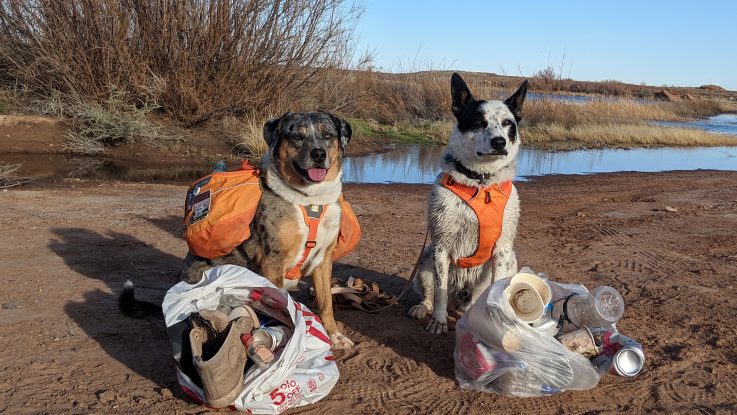
With the #trashtag movement still inspiring people to pick up other people’s trash and April 22nd being Earth Day, we figured we’d write about living small in an RV, consuming less, and hopefully not wrecking the planet. Read on for earth-friendly RV boondocking tips, shared from Tommi’s perspective.
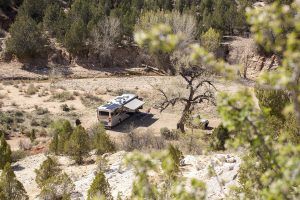
Boondocking and Respecting the Land
So we’re the first to admit that we’re definitely not experts on recycling or ecological consequences. However, we do consider ourselves good stewards of public lands.
We are full-time RVers who mostly live on public lands (boondocking); we practice “leave no trace” camping and hiking; and, often, we also pick up other people’s trash. We’re very aware of how much we can damage the soil just by driving over it, and we are very much nature lovers.
We are solar-powered and only very rarely run a generator or plug in to the electric grid. Also, as avid boondockers, we consume much less water than your average American.
Minimalism: Survival for RV Boondocking
As full-time RVers, minimalism and anti-consumerism isn’t just fashionable — it’s a matter of survival. Apart from the size of our motorhome and its gaudy swoop graphics, we attempt to be invisible and merely a part of the nature surrounding us.
Live Small, Consume Less
Living in an RV makes minimalism feel natural. Having less space means you have less need to fill the emptiness with unnecessary things. You’ll care more about how good the few things you have actually feel, how well they work. You realize you don’t need to “keep up with the Joneses” and buy the latest status items and gadgets.
In the beginning of your journey, you likely end up selling or donating many of your previous possessions; a year down the road, you won’t even understand why you ever had all those things.
Conserve Resources
Boondocking naturally teaches you to conserve resources. Limited water tanks teach you to not waste water. You’ll get used to navy showers (turning off water while you’re soaping up). And low-flow shower heads further slow down your water use to under one gallon per minute with a shut-off valve (check out this how-to video).
Likewise, living on batteries will make you very concretely understand how much electricity your gadgets and appliances use. You’ll replace burned incandescent bulbs and fluorescent tubes with LEDs not because some public service announcement told you to but because it benefits you. You’ll realize how much power leaving a television on for the whole day consumes. The wastefulness of air conditioning makes you look for a more suitable climate.
And living on solar power makes you realize how much potential there is in renewable energy sources. As I’m writing this, I’m running a power-hungry, two-way propane fridge on 110 VAC while dry camping, because the batteries are already full and the energy is free!
Similarly, having a fixed-size propane tank makes you very concretely understand how much energy you put into heating. The difference between overnight heating a whole RV or just the bedroom is huge. Needing to fill that propane tank will make you, once again, look for a more suitable climate. You can also switch to cooking with an induction plate to use solar power.
Reuse, Recycle
Reuse what you can. Buy sturdy reusable grocery bags and keep using the same bags for years.
For instance, we have some that are 10+ years old, while lower quality new bags break in a year. For frozen and cold things, we’re very happy with Trader Joe’s blue insulated bags, and if you haven’t been far west enough to experience Trader Joe’s groceries — well, put that on your bucket list.
Fun story — if you bring your own bags to a grocery store in Montana, they’ll say “You’re from California, aren’t you?”
Love Your Public Lands
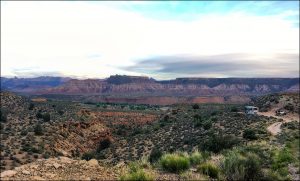
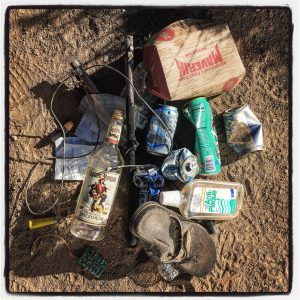
A couple of days ago we drove past a stretch of Bureau of Land Management (BLM) property where we had camped earlier. It was closed to camping due to the amount of trash that had been left around. For nature lovers like us, that just hurts. And even for the most selfish person, you should realize there’s a limited number of areas to camp, and they will become more regulated the more they’re abused.
So how can you do your part?
- You should camp responsibly and pack out your trash. Camping responsibly means camping on established sites and using only well-established fire rings (where fire restrictions allow).
- As for getting to your campsite, drive only on official roads and established tracks (where off-road travel is allowed). Don’t crush the brush.
- Pick up your dog poop, too. It doesn’t matter if it’s “natural.” It will still transmit disease and pile up with many visitors. In an arid climate, it takes years for dog poop to decompose.
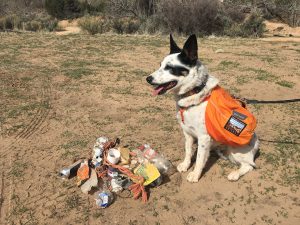
- Hike responsibly, too. Protect cryptobiotic soil and stay on established trails. And, once again, pick up your dog poop and carry it out — or better yet, make the dog carry it out.
- While you’re at it, don’t feed or approach wildlife.
- And, whether camping or hiking, blend into the natural surroundings. Don’t make unnecessary noise. Music, generators, ATVs, boats — even wind chimes — all count. Let others enjoy nature, not your presence.
How to Deal with Trash When RV Boondocking
Pickup truck owners tend to just transport trash bags in their pickup bed, but what do you do if you don’t have a pickup?
As far as we’re concerned, transporting trash — or especially dog poop — inside a car just isn’t an option!
In our case, we own a jeep. So we have a Trasharoo “backpack” on our Jeep’s spare tire that we use to transport trash (see my review). We also use its convenient mesh pockets to store and transport dog poop bags. If we’re not in bear territory and trash is not close by, it’ll expand to store two 13-gallon kitchen trash bags. It’ll also easily transport your recyclables.
Some people attach a Trasharoo directly to an SUV tailgate. If you don’t have any such attachment options, maybe consider a hitch-mounted cargo tray or box.
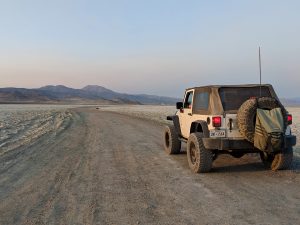
Where Can RVers Take Trash and Recycling?
This has turned out to be one of the biggest surprises about RV boondocking: how hard it is to get rid of your trash. Therefore, this makes you very aware of how much trash you’re creating.
With that in mind, here are a few tips to reduce your trash output:
- Avoid disposable products, especially easily avoidable things like plastic water bottles.
- Invest in water filtration and drink tap water from reusable containers, or at least use larger jugs and refill them from the filtered water vending machines you see at grocery stores.
- Use rechargeable batteries where you can, even if you have to go out of your way to make them work.
- While you’re at it, switch to biodegradable dog poop bags.
By my Northern European standards, recycling tends to be hard in the United States in general. In Finland, we had 11 different recycling bins in our residential building, and almost every grocery store had a reverse vending machine for returning plastic and glass bottles for a refund.
In contrast, recycling is almost impossible in small U.S. towns and especially in rural areas. Every now and then an RV park owner will brighten our lives by collecting recyclables, but I’m ashamed to say that where we tend to travel, we practically cannot recycle without carrying our recyclables for a month with us. National parks tend to be great at having receptacles for plastic bottles, but it’s definitely aimed more for things consumed while visiting.
So where do we dispose our trash? Each situation is unique, but here are our observations as full-time RVers:
- Gas stations often have only very small trash cans near the pumps with the main dumpster locked away; they haven’t worked well for us.
- Smaller towns, especially ones that have a tourism industry, tend to have a visitor center of some sort, and they tend to provide dumpsters as a courtesy to campers. Please ask first!
- Smaller and mid-size grocery stores often have dumpsters you can use to dump your trash and recycling. Buy a week’s worth of groceries and ask nicely; don’t just assume — and don’t even imagine doing that at a Walmart.
We can all make a difference. Let us know in the comments what you will be doing this Earth Day — and hopefully every day — to leave it better than you found it!
Meet the Family
Ane and Tommi, F462447, love how RV life allows them to go on adventures with their rescue dogs. Full-timers since 2016, they share their experiences and review campsites through a pet-friendly lens on Instagram and TheDogisDriving.com.


I enjoyed reading your post. Thank you for sharing such valuable information!
Also, thank you for being responsible stewards of our planet!
Happy Earth Day ♻️
This past earth day my husband and I experienced our first full time rv trip out west on BLM land. WOW WE LEARNED SO MUCH. … and wow we picked up so much trash. We experienced everything you mentioned down to asking restaurants if we could dump our trash in their bin haha! We’re at it now for 5 months and learning new ways of sustainability everyday. Thank you for this post!